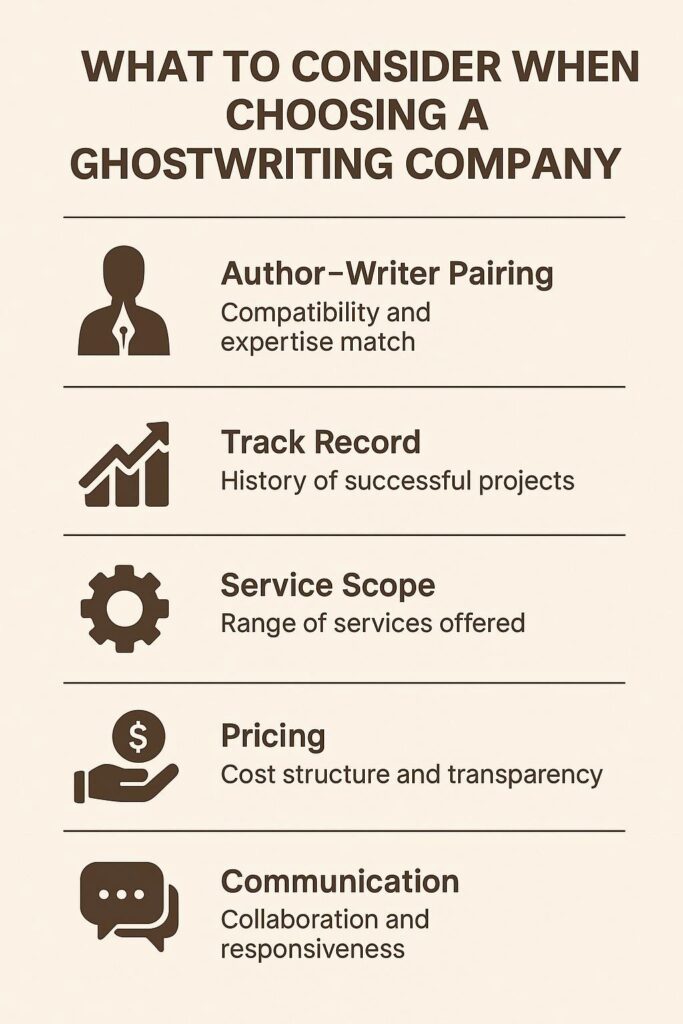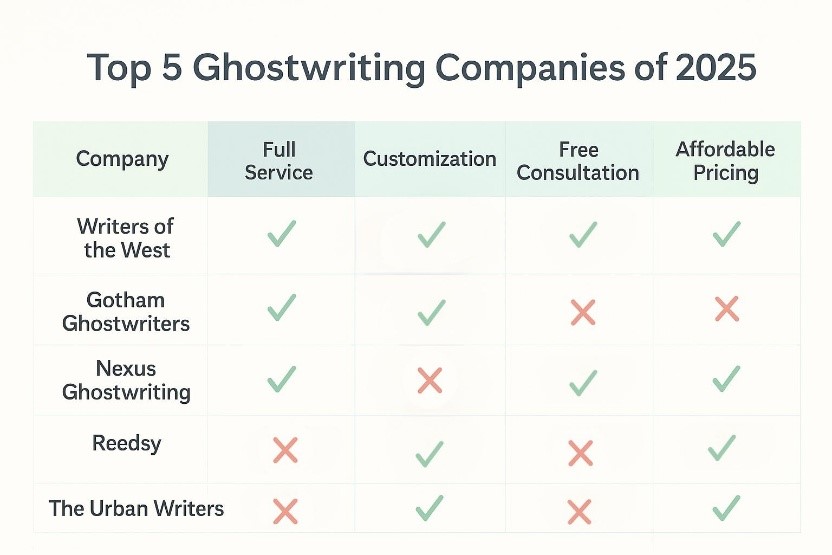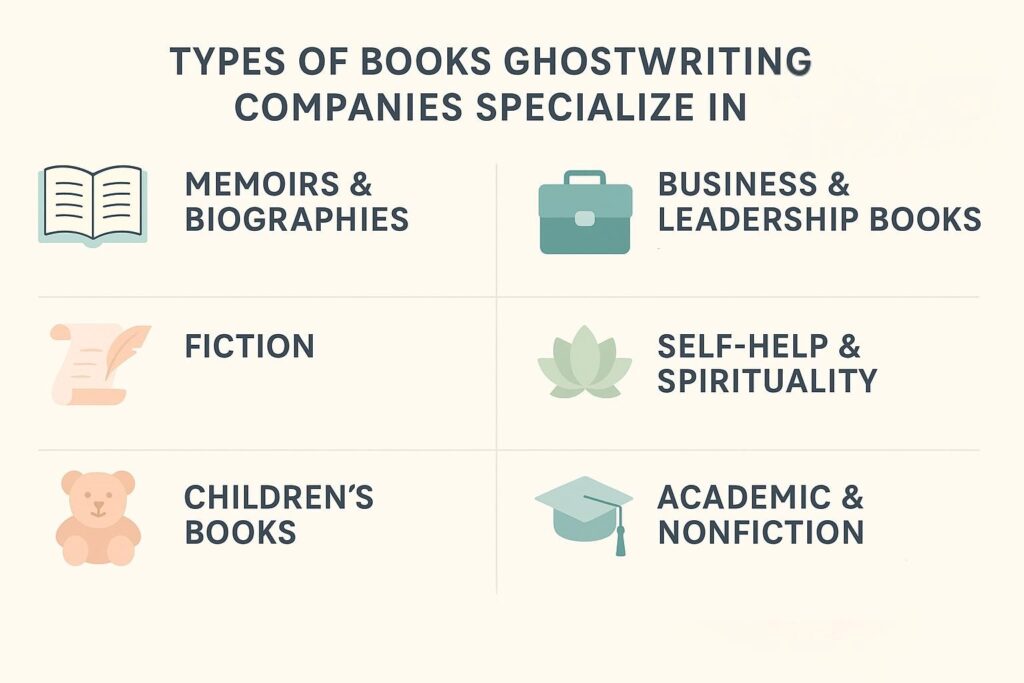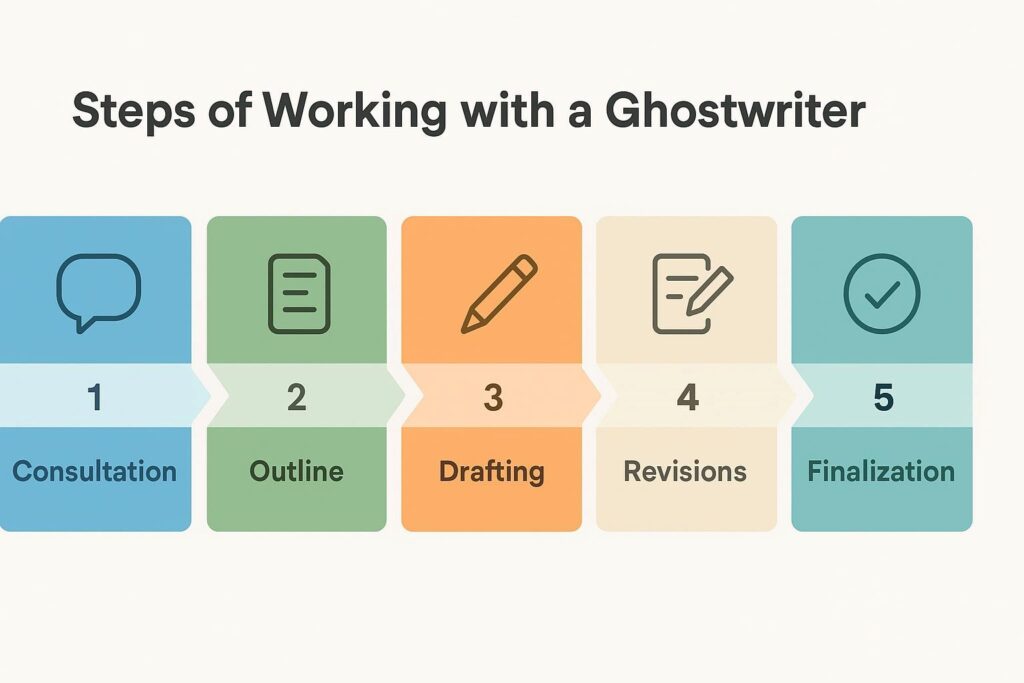Discover the top ghostwriting companies of 2026 in this expert-reviewed guide. Compare services, pricing, and features—plus see which agency checks all the boxes.
Introduction
Imagine this: You walk into a bookstore. You scan the shelves. And there it is—your name on the spine of a hardcover, nestled between bestsellers and award-winners.
Now pause. How did that book get there?
Chances are, someone like you had an idea. A powerful one. But instead of spending months battling writer’s block, they handed it off to a ghostwriter—a professional who could take their voice, their story, their brilliance—and shape it into something real.
That’s the magic of top ghostwriting companies in 2026. It’s not just for celebrities anymore. It’s for entrepreneurs, coaches, founders, thinkers—people with something to say, but no time (or desire) to write it themselves.
In this guide, you’ll find the leading ghostwriters take charge this year. We’ll break down what they offer, how they work, and how to choose the right partner to get your book from idea to finished manuscript—without losing your voice along the way.
What Is Ghostwriting & Why Is It in Demand?
In 2026, more people than ever are turning to top ghostwriting services to bring their book ideas to life—quietly, professionally, and with less stress.
What Is Ghostwriting, Really?
Ghostwriting means someone else writes your book, article, or content, but you’re credited as the author. You provide the ideas, voice, and experience. The ghostwriter turns that into something compelling and structured.
They don’t just type out your thoughts—they help shape and sharpen them. Good ghostwriters can mirror your tone and turn scattered stories into something people actually want to read.
Who’s Hiring Ghostwriters?
Once reserved for celebrities and politicians, ghostwriters are now working with all kinds of clients—coaches, entrepreneurs, content creators, and first-time authors. The common thread? These people have something worth saying, but no time or desire to write a whole book from scratch.
It’s not about cutting corners—it’s about getting help from someone who knows how to turn an idea into a book that holds attention from start to finish.
Ghostwriting for All Kinds of Books
Ghostwriters cover everything from memoirs and fiction to business strategy, leadership, self-help, and even children’s stories. Each genre has its own tone and expectations, and a good ghostwriter knows how to hit the right notes while keeping your message intact.
They’re not just writers—they’re collaborators, editors, and sounding boards.
Why Now?
Time is tight. Attention is short. And the publishing world is changing fast. Writing a book is still powerful—but now, more than ever, people want help getting there faster, with better results. Ghostwriters meet that demand.
Whether you’re writing to build your authority, leave a legacy, or finally get that novel out of your head, there’s no shame in bringing in an expert.
And with so many top ghostwriters for hire offering flexible, professional support, getting your book done might be easier than you think.
How to Choose the Right Ghostwriting Company
Picking a ghostwriting company is in reality choosing someone to help tell your life story—it’s personal, vulnerable, and if you get it wrong, it’s expensive. But get it right? You could end up with a powerful book that captures your voice, sharpens your message, and actually gets read.
Here’s how to make sure you choose wisely.
Look at Their Track Record
Any company can say they’ve worked with bestselling authors. The real question is: can they show you?
Check their portfolio. Look for published books, client testimonials, case studies, or even before-and-after writing samples. See if they’ve worked in your genre, and more importantly—if the work feels human, readable, and professional.
If a company is vague about who they’ve helped or refuses to show samples, take that as a red flag.
Understand Their Process
Every company works differently. Some are hands-on from start to finish. Others might pass your project between multiple ghostwriters or editors behind the scenes.
You want to understand:
- Who will you be working with?
- Will you get to speak directly with your ghostwriter?
- How many rounds of revisions are included?
- Do they help with editing, formatting, or publishing?
Transparency here matters. A clear, step-by-step process builds trust—and keeps you from feeling lost halfway through the project.
Ask About Rights and Ownership
Here’s a big one: when the book is done, who owns it?
With reputable companies, the answer should be simple—you do. You get full authorship credit, copyright ownership, and control over what happens next.
Avoid any vague language in contracts that implies shared rights or future royalties unless that’s something you’ve explicitly agreed on. The last thing you want is legal headaches down the line.
Don’t Ignore Pricing Models
Good ghostwriting isn’t cheap—and it shouldn’t be. You’re paying for expertise, time, and the ability to sound like you on the page.
That said, pricing should still be clear and predictable. Make sure you understand what’s included in the quote:
- Is it a flat fee or hourly?
- Are revisions extra?
- What happens if you want to pause the project?
Some of the best ghostwriting services will offer payment plans or tiered packages so you can choose what fits your budget and goals.
Communication Is Everything
If a company feels cold, unresponsive, or robotic in the early stages—it’s unlikely to improve once the contract is signed.
You’re not just hiring a writer. You’re building a relationship. The more comfortable and collaborative it feels from the start, the smoother the process will be. Trust your gut.

And while there are plenty of individual freelancers available, many authors turn to the top ghostwriting companies because they offer structure, editorial support, and publishing help all under one roof.
Top 5 Ghostwriting Companies of 2026 (With Pros & Cons)
When you’re choosing a ghostwriting partner, it’s easy to get overwhelmed by options. That’s why I’ve handpicked five standout outfits that consistently deliver quality, reliability, and a smooth process—each with its unique strengths and limitations.
Writers of the West
Overview: Known for its deep bench of experienced writers, this agency specializes in memoirs, business books, and thought leadership. They focus on capturing your voice and turning it into compelling narratives.
- Pros:
- Author–writer pairing based on genre fit and tone
- Transparent pricing with clear milestones
- Full-service support: editing, formatting, publishing advice
- More than 200 published bestsellers
- Offers publicity strategy sessions post-completion
- Cons:
- Waiting list can be long (3–6 months)
- Premium pricing—best for serious projects
- Requires author input to hit the right tone
Gotham Ghostwriters
Overview: A behemoth in the ghostwriting world, Gotham has been around for years and has a portfolio that includes celebrities, Fortune 500 founders, and high-profile memoirs.
- Pros:
- Huge talent pool of specialized writers
- Proven track record with published bestsellers
- Includes developmental editing and formatting
- Offers workshops and coaching alongside writing
- Cons:
- Premium pricing starts in the five figures
- Assignments can feel corporate—less personalized than boutique firms
- Multiple handoffs can dilute your “voice” at times
Nexus Ghostwriting
Overview: A mid-sized agency focused on business and self-help genres. They offer flexible packages and are known for quick turnaround times.
- Pros:
- Clear, tiered packages with pricing transparency
- Fast delivery: typical projects are completed in 3–4 months
- Includes unlimited revisions until you’re satisfied
- Content marketing and book launch support available
- Cons:
- Mainly limited to non-fiction genres
- Quality can vary due to writer turnover
- Slightly less emphasis on narrative depth
Reedsy
Overview: Reedsy isn’t a traditional agency—it’s a marketplace that connects you directly with vetted freelance ghostwriters. It’s often the bridge between agency consistency and freelancer flexibility.
- Pros:
- Access to thousands of vetted professionals
- You pick your writer based on style, reviews, and niche expertise
- Transparent budgets—no middleman markup
- Built-in collaboration tools with milestones and direct contact
- Cons:
- Self-managing—you’re responsible for workflow
- Quality depends on your ability to vet candidates
- No central support team to manage project logistics
The Urban Writers
Overview: A newer player with a creative edge, The Urban Writers specialize in fiction and cultural memoirs. They pride themselves on elevating diverse voices.
- Pros:
- Great at capturing authentic, nuanced experiences
- Emphasis on collaborative creativity rather than rigid process
- Transparent pricing and clear deliverables
- Support for audio book versions and multi-format publishing
- Cons:
- Limited to fiction and narrative-driven non-fiction
- Smaller team means limited capacity for large projects
- Not ideal for business or self-help genres
Choosing between these top ghostwriting companies comes down to your priorities: budget, timeline, genre, and how much you want someone to manage vs co-create.

If you’re looking for a reliable, hands-off approach with full support, Gotham offers that—but at a price. Want more flexibility to choose your own writer and stay in charge? Reedsy is ideal. Are you after fast, structured help in business or self-help? Nexus is a solid mid-tier choice. If creative collaboration and authentic voice are key, The Urban Writers shine. And for a high-end boutique experience, Writers of the West often deliver the most intimate, polished results.
Key Ghostwriting Services Offered
Not all ghostwriting projects are created equal—and neither are the services offered by different companies. Whether you’re planning a detailed memoir or a tight business book, the quality and depth of service you receive can make or break your final product.
Here’s a breakdown of the key services you should expect from any serious ghostwriting provider.
Manuscript Writing
This is the foundation. It starts with turning your raw ideas, interviews, or outlines into a full-length manuscript. Your ghostwriter listens to your story, captures your tone, and translates your thoughts into engaging, structured writing that feels like it came from you.
Some writers work from scratch; others polish rough drafts. Either way, they help you go from concept to complete book with confidence.
Storyboarding & Outlining
Before the writing even begins, a solid ghostwriting process should include outlining and story development. This step brings clarity to your project. It helps map out chapters, set narrative flow, and ensure your message unfolds in the right order.
This part of the service is especially useful if you’re starting with loose ideas or disconnected themes. It’s the blueprint that keeps the rest of the writing on track.
Developmental Editing
Think of this as big-picture editing. Once the draft is complete, the developmental editor reviews the structure, content, tone, and flow. They ask tough questions: Is the message clear? Does it resonate? Are there weak sections or missing pieces?
Some of the best ghostwriting services include this step because it pushes your manuscript from good to great—shaping not just how it’s written, but what it says.
Line Editing & Copyediting
There are all kinds of editing. These edits deal with clarity, sentence structure, grammar, and consistency. Line editing is about improving the flow and feel of your writing; copyediting focuses on fixing mechanical issues like punctuation, syntax, and spelling.
This stage is vital for keeping your book polished, professional, and easy to read. Skipping it is one of the fastest ways to lose credibility with your audience.
Book Formatting
Formatting makes your book look like a book. It’s the difference between a Google Doc and a publish-ready manuscript. You get proper margins, font styles, headers, and chapter breaks—designed for both print and digital.
Most top ghostwriting services include basic formatting, while some offer advanced layout design if you’re planning a commercial release.
Publishing & Marketing Add-ons
Some ghostwriting companies, like Writers Of The West, go beyond writing. They’ll help you self-publish, land a traditional agent, or launch your book with a marketing plan. Services might include cover design, Amazon listing optimization, press releases, or even author branding strategy.
That’s why many clients stick with the reputable ghostwriting firms—because they don’t just deliver a manuscript, they guide you through the entire publishing journey.
At the end of the day, if you’re looking for the best ghost writing service, it’s not just about the words—they need to understand storytelling, structure, editing, publishing, and how to make your voice stand out in a crowded market.
Ghostwriting for Different Genres
One of the biggest misconceptions about ghostwriting is that it’s a one-size-fits-all service. In reality, writing a business book is nothing like writing a memoir—and neither has much in common with a children’s story or a novel. The genre you’re writing in shapes everything: tone, pacing, language, and structure.
That’s why genre experience matters when choosing your ghostwriter.
Memoirs & Biographies
Memoirs aren’t just timelines. They’re emotional journeys. A good ghostwriter knows how to dig deep, pull out the most defining moments, and structure them into a narrative that keeps readers turning the page.
Capturing your voice is critical. This isn’t just about what happened—it’s about how it felt. The ghostwriter’s job is to walk a fine line between raw honesty and clean, compelling storytelling.
Business & Leadership Books
Business and leadership books have a different goal: to build authority. Whether you’re a CEO sharing insights or a founder writing about startup lessons, your book needs to strike a balance between being smart and being accessible.
A ghostwriter in this space knows how to structure thought leadership without making it sound like a lecture. They’ll use stories, frameworks, and clear language to make complex topics feel simple—and memorable.
Fiction & Novels
Fiction is a completely different terrain. Here, it’s about plot arcs, character development, pacing, and dialogue. A ghostwriter working in fiction needs to understand genre tropes—whether it’s thriller, romance, fantasy, or something else—and know how to weave them into an original, satisfying story.
Fiction clients often provide a concept or partial draft. The ghostwriter helps build it into a full manuscript, refining scenes, world-building, and emotional flow.
Self-Help & Spirituality
Self-help writing walks a tightrope: it needs to be inspiring without being fluffy, structured without sounding clinical. These books are often very personal—and readers expect to be spoken to with empathy and clarity.
A ghostwriter in this genre needs to understand human psychology, motivation, and how to tell stories that guide people toward transformation.
Children’s Books
Writing for children isn’t “easier”—it’s just different. The language needs to be age-appropriate, engaging, and rhythmically readable. Illustrations are also a big factor. Ghostwriters who specialize here often collaborate with designers or provide manuscript drafts ready for visual adaptation. Understanding reading levels, tone, and pacing is essential—especially if your book targets a specific age group or educational goal.

Working with writers who specialize by genre is one of the reasons clients gravitate toward the top ghostwriting companies. They often have diverse talent pools with specialists in different genres, allowing you to find someone who not only writes well—but understands your world.
Step-by-Step Process: Working with a Ghostwriter
Working with a ghostwriter doesn’t need to be mysterious. In fact, when done well, it should feel structured, collaborative, and even energizing. Here’s what you can expect from the typical ghostwriting journey—from idea to finished manuscript.
Step 1: Discovery Call & Consultation
Everything starts with a conversation. You and the ghostwriter (or agency rep) get on a call to talk about your project, your goals, and your expectations. This is where you explain your idea, share any existing materials, and see if there’s chemistry.
The ghostwriter will usually ask you about your audience, timeline, and the tone you want your book to have. It’s your chance to make sure they get you—not just as a client, but as a voice.
Step 2: Agreement & Contract Signing
Once you’re aligned, you’ll receive a contract outlining deliverables, timelines, pricing, and rights. Read this carefully. A good contract should protect both parties and clarify things like:
- Who owns the final content (spoiler: it should be you)
- What happens if deadlines slip
- How many revision rounds are included
This step creates trust—and ensures there are no surprises later on.
Step 3: Interviews, Research, & Outline Creation
Here’s where the ghostwriter gets to work. They’ll usually start by conducting in-depth interviews with you. These can be voice calls, video chats, or written Q&As—whatever works for both sides.
They’ll also do any necessary research and begin outlining your book chapter by chapter. You’ll get a chance to review this structure and give feedback before writing begins.
Step 4: Drafting & Revisions
The ghostwriter begins writing your book based on the outline. You’ll usually receive chapters in batches for review. Expect to give feedback on things like tone, flow, or clarity.
Revision is a key part of the process. The best collaborations involve honest input, clear communication, and room to make changes. A top ghostwriter for hire will expect and welcome your feedback—it’s how they get your voice just right.
Step 5: Final Editing, Proofreading, & Formatting
Once the full manuscript is written and revised, it goes through editing and proofreading. This might be handled by the ghostwriter or a separate editor. The goal here is to fix grammar, polish sentence structure, and format the manuscript for readability.
Some services will also help with layout design and basic book formatting—getting you closer to a publish-ready file.
Step 6: Publishing or Delivery
Depending on your agreement, the ghostwriter may deliver a final manuscript only—or they may also assist with publishing. That could include self-publishing guidance, help finding a literary agent, or creating marketing assets like back-cover copy and author bios. Many of the top ghostwriting companies offer these add-ons, especially if you’re looking for a done-for-you publishing solution.

Benefits of Hiring a Ghostwriting Company
Writing a book sounds romantic—until you sit down and realize how much work is involved. It’s not just about putting words on a page. It’s about shaping a message, building a structure, maintaining your voice, and doing it all without burning out halfway through.
That’s where a ghostwriting company makes all the difference. Here are the biggest benefits you get when you bring in professionals to help.
Professional Storytelling
The best ghostwriters know how to tell a story. Not just any story—your story. Whether you’re writing a memoir, a leadership book, or something else entirely, a ghostwriter brings structure, clarity, and pacing to your ideas.
They’ll help you avoid tangents, strengthen your narrative arc, and write in a way that actually hooks readers.
Massive Time Savings
Let’s be honest: writing a book takes time. Months, if not years. And if you’ve got a business to run or a family to care for, those writing hours just don’t exist.
Hiring a ghostwriting company allows you to focus on your zone of genius while someone else handles the writing. You stay involved—through interviews, feedback, and direction—but you’re not buried in drafts or second-guessing every paragraph.
Built-in Editing & Publishing Support
Most ghostwriting firms offer more than just writing. You also get developmental editing, proofreading, formatting, and sometimes even publishing support.
This is especially valuable if you’re planning to self-publish. You don’t need to track down an editor, a formatter, and a designer—they’re often built into the package.
Consistent Voice & Quality
Maintaining a consistent tone and style over the course of 40,000 to 70,000 words is harder than it looks. Ghostwriters are trained to keep your message cohesive from start to finish, even across multiple drafts and feedback rounds.
You don’t have to worry about sounding robotic, repetitive, or off-brand. A professional ghostwriter captures your voice and carries it throughout the entire manuscript.
Peace of Mind
There’s something deeply reassuring about knowing someone is in your corner—someone who’s done this before, who knows the process, and who won’t let you fail.
Working with experienced professionals, especially those from the top ghostwriting companies, removes the guesswork. You don’t need to figure it all out yourself. You just show up, share your story, and let them guide the process.
Common Pitfalls to Avoid When Hiring a Ghostwriter
Hiring a ghostwriter can be transformative—but only if you choose wisely. The wrong fit or a vague agreement can lead to frustration, delays, and wasted money. To make sure your project stays on track, watch out for these common traps.
Hidden Fees
It might start with an attractive quote, but what’s included? Some ghostwriting providers charge extra for things like revisions, editing, or formatting—things you thought were part of the original package.
Always ask for a breakdown of costs. If the pricing feels vague or too good to be true, it probably is. A clear contract with no hidden charges is non-negotiable.
No Contract or Unclear Terms
Handshake deals don’t cut it in ghostwriting. Without a formal agreement, you risk disputes over timelines, deliverables, ownership, or even the final manuscript itself.
Make sure your contract covers:
- Scope of work
- Timeline
- Payment structure
- Number of revisions
- Copyright and ownership rights
If the contract feels overly complex or intentionally unclear, that’s a red flag.
Overpromising with Little Delivery
Some ghostwriting companies will promise bestseller status, guaranteed publishing deals, or overnight delivery. Be skeptical of any company that makes guarantees that sound too good to be true.
A top ghostwriter service won’t promise magic—they’ll promise a strong, structured process. Look for honesty and transparency, not flashy marketing.
Limited Communication or Rigid Workflow
A great ghostwriting project is a collaboration. You should be able to check in, give feedback, and feel part of the process. If the workflow is one-sided or overly rigid, it’s going to be hard to get a final result that feels like yours.
Ask up front how you’ll communicate, how often, and what role you’ll play in shaping the manuscript.
No Guarantees on Quality or Timelines
Reputation matters. If a ghostwriter can’t show samples or offer client references, proceed with caution. Similarly, if their timeline seems overly vague or subject to constant change, you could be waiting much longer than expected.
A professional ghostwriter should have a clear timeline, strong references, and work you can review before committing.
Bonus Tip: Don’t Ignore the Gut Feeling
Sometimes, it’s not about the proposal or the price—it’s about how they make you feel. Do they listen? Do they understand what you’re trying to say? Do they care about your story?
Trust that instinct. The best ghostwriting relationships are built on trust, communication, and shared vision.
FAQs
How much does ghostwriting cost?
It depends on the scope, length, and the experience of the ghostwriter. A full-length book can range from £5,000 to £50,000 or more. Some companies offer tiered packages, while others quote custom prices based on complexity. Be wary of ultra-low offers—they often lead to low quality or hidden costs.
Who owns the copyright?
You do. In a proper ghostwriting agreement, the client retains full ownership of the manuscript and all related rights. This should be clearly stated in your contract. Once the final payment is made, the work is legally yours.
How long does the process take?
Most book projects take anywhere from 3 to 9 months, depending on length, revisions, and how involved you are. Some high-end services may offer expedited timelines, but quality ghostwriting takes time—especially if you’re aiming for a polished, publish-ready manuscript.
Can I stay involved during the process?
Absolutely. In fact, top ghostwriting companies encourage your involvement. You’ll typically participate in interviews, provide feedback on outlines and drafts, and approve the final manuscript. The more collaborative the process, the more the book sounds like you.
Do ghostwriting companies help with publishing too?
Many do. Some offer self-publishing support, including formatting, cover design, Amazon listing help, and even book marketing strategy. Others might connect you with agents if you’re going the traditional publishing route. It depends on the service package.
Is it ethical or legal to use a ghostwriter?
Yes, ghostwriting is completely legal—and widely accepted. Think of it as hiring an architect for your ideas. As long as both parties agree that the client is the credited author, there’s no issue. Ghostwriting is common in memoirs, business books, and even fiction.
Can I get a refund if I’m not satisfied?
Refund policies vary. Some companies offer partial refunds or revision rounds, while others don’t offer refunds once the work begins. That’s why it’s crucial to check the contract, request samples, and ensure you’re clear on what happens if things don’t go as expected.
Conclusion
Publishing a book is one of the most powerful ways to share your story, build authority, or leave a lasting legacy. But writing it? That’s where most people get stuck.
In 2026, ghostwriting has become the bridge between having a great idea and holding a finished book in your hands. From memoirs to business guides to full-blown novels, professional ghostwriters are helping people like you turn complex thoughts into clear, compelling narratives.
We’ve covered everything you need to know—from how ghostwriting works, to how to choose a company, to the services and pitfalls you should watch for. And if you’re serious about quality, the best ghostwriting companies offer more than just writing. They bring structure, expertise, and often, a full publishing plan to support your vision. If you’re sitting on a story, message, or method you know people need to hear—don’t let writing be the thing that holds you back.















